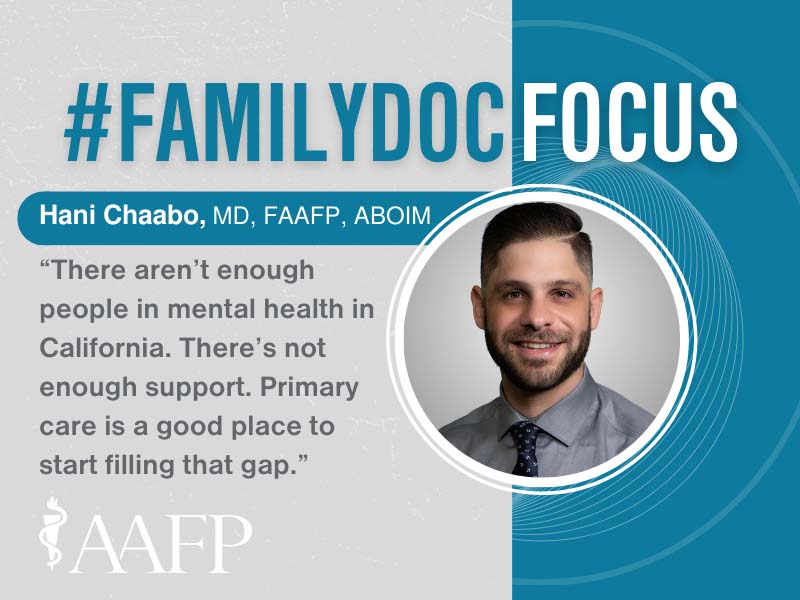Well-being Leader Addresses Mental Health in Primary Care
Feb. 14, 2024, David Mitchell — Hani Chaabo, M.D., FAAFP, ABOIM, completed family medicine residency five years ago, but his education and training never stopped.

Chaabo followed residency training in West Virginia with a two-year integrative medicine fellowship at the University of Arizona. He then completed a primary care psychiatry fellowship at the University of California Irvine in 2023, and this year he began a new fellowship at UCI in addiction medicine.
“It’s allowed me to be very confident in treating patients in the mental health space and run our addiction clinic,” said Chaabo, who completed a train-the-trainer certification in primary care psychiatry last year. “There aren’t enough people in mental health in California. There’s not enough support. Primary care is a good place to start filling that gap.”
Identifying a problem and taking the lead in addressing it isn’t a new approach for Chaabo, who is the medical director of well-being and director of an integrative stress reduction clinic for Ridgecrest Regional Hospital.
Chaabo already was a vocal proponent for mindfulness as a resident when the Accreditation Council for Graduate Medical Education revised its Common Program Requirements in 2017, calling for all accredited residency programs to address well-being. He was asked by his medical center’s graduate medical education department to create and deliver an education module for all of its residency programs.
A few years later, Chaabo had to think even bigger as medical director of well-being and chair of the wellness committee for his employer.
“It wasn’t just thinking about things to do as an individual,” he said. “For the first time, I was involved in listening to what people needed and creating interventions and a healthy environment for doctors. I needed to learn more.”
Chaabo found what he needed in Leading Physician Well-being, the AAFP’s 10-month certificate program that teaches its scholars the skills needed to lead change in their practices or health care organizations. He now serves as core faculty for the program.
“It’s been blessing,” he said.
Two years into implementing evidence-based system-level interventions through a dedicated inter-departmental and multidisciplinary well-being taskforce, Ridgecrest Regional Hospital was recognized by the AMA’s Joy In Medicine Health System Recognition program, for its emphasis on prioritizing clinician well-being.
Chaabo devotes roughly 70% of his clinical time to mental health and 30% to addressing lifestyle changes. He works with patients in individual and group settings in the Mindfulness-Based Lifestyle Change program he developed utilizing emotional intelligence, lifestyle medicine and motivational interviewing.
“That’s my baby,” Chaabo said. “Group visits are underutilized in primary care. So much healing happens in groups. That, for me, is one of the most important way to deliver care.”
Patients spend four hours each week focusing on trauma and its effects. The second four weeks are focused on making lifestyle changes related to nutrition, cooking, sleep and exercise.
“People who have been through the program and still applying the concepts are still reaping the benefits years later,” he said. “They’re completely different people.”
Chaabo was co-author of an article about physician well-being published in the January/February issue of FPM. He also was a presenter for an AAFP webinar in January focused on how trauma affects mental health and healthy ways to cope. A recording of that webinar is now available (and free to AAFP members). Both the FPM issue and webinar offer CME credit.
Chaabo will be a plenary speaker during the AAFP’s Physician Health and Well-being Conference, which is May 6-8 in Scottsdale, Ariz. He hopes to reach even more people online early this year when he launches a telemedicine platform with services for integrative medicine, mental health, lifestyle change, weight loss and addiction. Chaabo, who has more than 80,000 followers on Instagram, also plans to offer patient education in the form of online courses. A free mindfulness-based resilience course for health care workers already is available.
“I’m not leaving my job,” he said, “but I want to open services to people beyond my small town and help more people.”